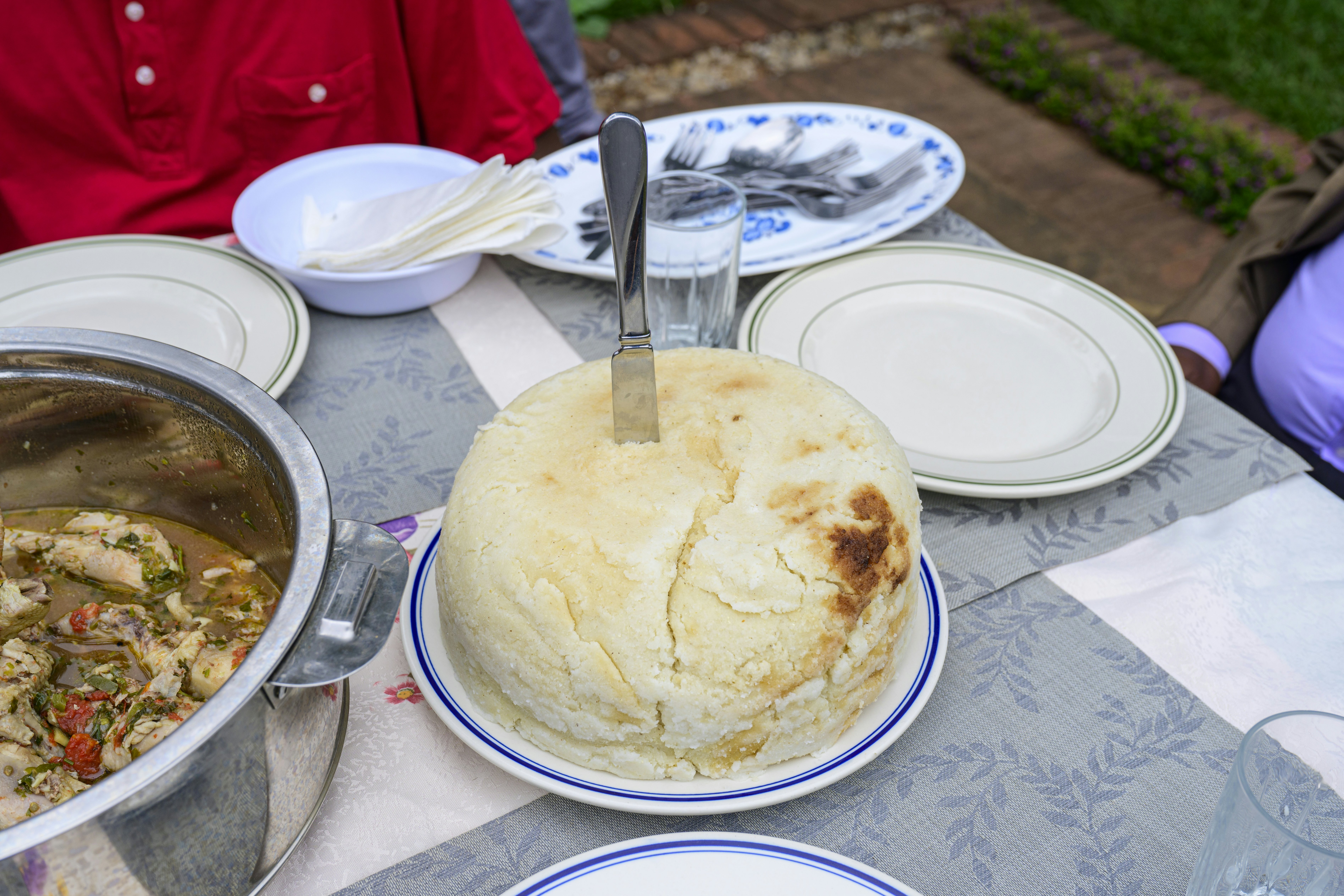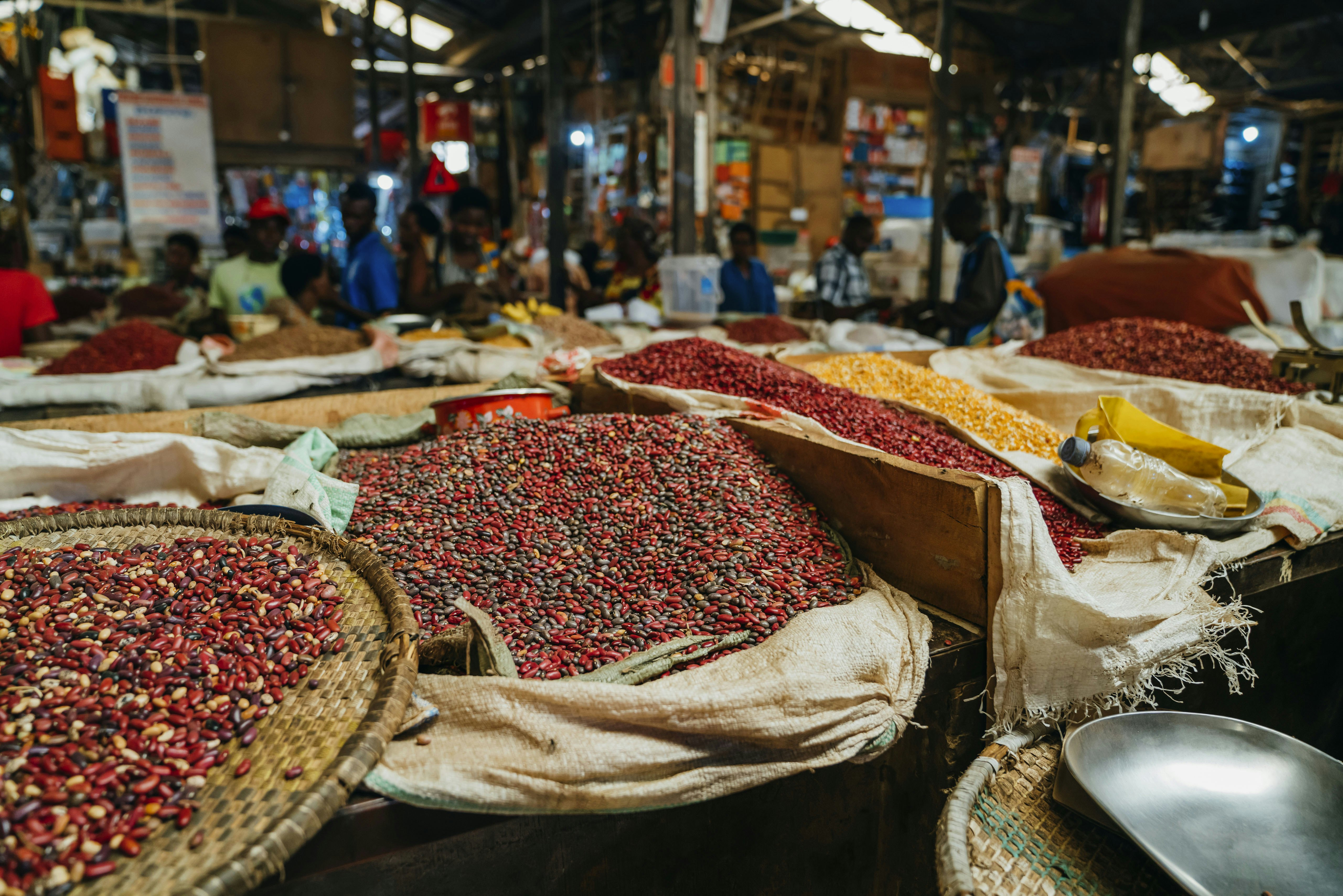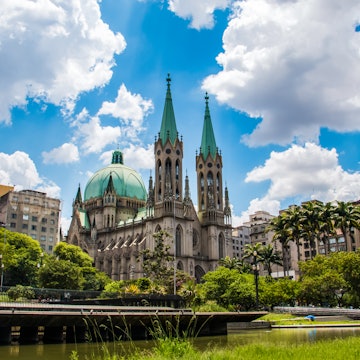
Rwanda's food scene: The taste of a nation
Sponsored by

Nov 30, 2023 • 5 min read

Brochettes are just one of the dishes that makes Rwandan cuisine so flavorful © Photo via Getty Images; Illustration by Dustin Johnson / Lonely Planet
Squeezed between Congo, Uganda, and Tanzania, Rwanda is a small landlocked East-African nation that offers a great mix of cultural activities, rich wildlife and nature, and vibrant art to curious travelers. Whether you're wandering the streets of the capital, Kigali, or relaxing on the shores of Lake Kivu, one of seven African Great Lakes, you can get the taste of this resilient nation through the variety of local and regional delicacies that make traveling in Rwanda so flavorful.
Called the “Land of a Thousand Hills,” Rwanda indeed has a hilly and fertile terrain, where lush vegetation blooming atop the red, mineral-rich soil creates a strikingly colorful landscape. Many Rwandan families, particularly in the rural parts of the country, rely on subsistence farming with crops they can cultivate on a small scale. A typical Rwandan diet thus consists of items like cassava leaves, plantains, bananas, avocados, corn, millet, and beans. Here are the staple dishes you shouldn’t miss in Rwanda.

The staples of Rwandan cuisine
Perhaps the most ubiquitous of all Rwandan meals is the ugali, a side dish commonly found throughout sub-Saharan Africa. This stiff, porridge-like ball of vital carbs is made with maize corn, sometimes mixed with cassava flour. Ugali serves as a base for the varieties of rich stews, curries, and sauces for which Rwanda is known.
Speaking of stews: arguably Rwanda’s most popular dish is the isombe, a stew of cassava leaves pounded into a deep-green paste. This paste is then boiled in flavorful beef, chicken, or fish stock alongside onions, spinach, or peppers, and topped with fresh peanut butter, spices, and a bit of palm oil for added richness.
A typical Rwandan table is not complete without matoke: a sweeter take on mashed potatoes made with matoke bananas indigenous to the African Great Lakes region. Short and starchy, matoke bananas are harvested green, then steamed while wrapped in their leaves in a laborious process, before finally getting mashed. The result is a satisfying, savory staple with a touch of sweetness.

The city flavors
Inside Rwandan cities like the bustling city of Kigali, a mix of East African, European, Chinese, and Indian influences has created an eclectic cuisine. Here, you can expect to taste a variety of meat-based dishes like brochettes, skewers of beef, goat, fish, or pork spiced with chilis and grilled over charcoals with onions or peppers, agatogo, a filling stew with plantains, cassava leaves or spinach, and a serving of beef or goat, and akabenz, dry-fried lime barbeque pork.
Most restaurants will also serve helpings of potato chips or Indian-style chapati flatbreads to accompany the meals. Igisafuria is common on the menu. The name for this hearty dish, not unlike the Moroccan tagine, comes from the Kinyarwanda word for ‘pot.’ The ingredients for igisafuria – pieces of chicken, beef, or goat, vegetables like plantains, potatoes, and onions, and beans – are stewed for hours in a single pot, releasing their fragrant juices into the resulting flavorful stew.

In Nyamirambo, Kigali’s Muslim quarter, the specialty is the ‘big fish,’ a whole tilapia grilled with onions, garlic, and carrots for a distinctive smoky taste that’s typically served for 2-3 people and eaten with hands. On the shores of far-eastern Lake Kivu, a little sardine-like fish, sambaza, is a common starter. Deep-fried in batter and served with a dash of lemon and spicy pili pili sauce made with chili and habanero peppers, sambaza is a perfect snack to enjoy after a long day spent exploring the lake.

The land of coffee and tea
Rwanda’s rich volcanic soil, coupled with high altitudes, creates ideal growing conditions for coffee, which, along with tea, is one of the country’s top exports.
A network of close to half a million small growers produce coffee all over Rwanda, including the northernmost Virunga region, home to Rwanda’s silverback mountain gorillas inside the Volcanoes National Park, and Akagera, a southeastern region with the country’s only Big Five destination, Akagera National Park. The most famous coffee-producing area is concentrated around Gisenyi, near the shores of Lake Kivu. Here, travellers can visit spots like the Kinunu Washing Station overlooking Lake Kivu or the Ingoboka Collective on Nyamirundi Island, to learn about Rwanda’s renowned coffee variety, Bourbon Arabica.
Coffee culture is strong in Kigali, with establishments like Question Coffee in Gishushu, an organization that empowers more than 30,000 women coffee growers across Rwanda, and Rubia Coffee Roasters in Kimihurura, a specialty coffee roastery and cafe, growing every year.

Although Rwanda exports its award-winning coffee worldwide, most Rwandans have traditionally preferred to drink tea instead. Outside of the capital, tea remains a favorite drink, sweetened with milk and sugar and enjoyed throughout the day. To see the process of growing tea in action, visit the southwestern Nyungwe region, home to one of Africa’s oldest rainforests, which is known for rolling hills covered with the tea plant. Here, tea estates like Gisovu and Gisakura offer public visits to their plantations. One & Only Nyungwe House hotel is set within a working tea plantation at Gisakura, where guests can pick, dry, and brew their own cup of Nyungwe tea.
In addition to coffee and tea, another must-try drink in Rwanda is urwagwa, or banana beer. This homebrewed favorite is popular in rural areas, but you can also find it in the cities. Urwagwa is made with bananas that are left to ferment underground for several days. Then, grass blades are used to mush the fruit together and extract juice from the fermented bananas. Ground millet or sorghum is added before the mix is put away for another few days. With the addition of honey, the resulting sweet-and-sour-tasting brew can be enjoyed for about three months.
Red Rocks Rwanda – a social enterprise that runs a record label, a restaurant, a community tourism project, and a craft shop – near Volcanoes National Park offers urwagwa making and tasting classes, complete with dancing, songs, and plenty of social time enjoyed during the beer-making process.
Sponsored by Visit Rwanda
As a travel entertainment and inspirational media outlet, we sometimes incorporate brand sponsors into our efforts. This activity is clearly labeled across our platforms.
This story was crafted collaboratively between Visit Rwanda and Lonely Planet. Both parties provided research and curated content to produce this story. We disclose when information isn’t ours.
With sponsored content, both Lonely Planet and our brand partners have specific responsibilities:
-
Brand partner
Determines the concept, provides briefing, research material, and may provide feedback.
-
Lonely Planet
We provide expertise, firsthand insights, and verify with third-party sources when needed.














